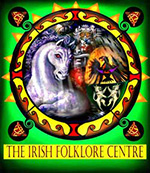This is a Wexford story from Patrick Kennedy’s (1866) collection. It is also found in Brittany. It shows both the helpful and impatient side to the fairies. A rath was an ancient ring fort which, today, is a small circular meadow surrounded by a mound overgrown with bushes. As my intent is just to get across the story line, I have not used colloquial Irish of the time. It is an archetype fairy story.
Everyone from Bunclody to Enniscorthy knows the rath between Tombrick and Munfin. There was a poor, honest little man living nearby, whose back had been broken as a child, and who made a living by making furniture and beehives from straw and briers. He was very good at it.
After having enjoyed himself at the fair in Enniscorthy, he was walking home and decided to take a short cut. He was singing merrily, being a little worse for drink. He turned into a field by the grassy bank of the rath, which was overgrown with bushes and blackthorn. He felt a need to sit down and rest; shortly he fell asleep.
Animated by all sorts of dreaming images, he woke up with a start. Looking around he saw that there was now a gap in the bank, framed by fine pillars. Inside was a great vaulted room, with a hundred hanging lamps, and thousands of little ladies and gentlemen in green and red dancing and singing to the music of pipers and fiddlers.
He crept in and sat in a corner. After a time he found the singing rather tedious, as the words ‘Monday, Tuesday’ were repeated again and again. He finally plucked up courage and shouted out at the end of a verse ‘And Wednesday’. With cries of delight, the singers took up the new refrain with great gusto.
When the dance ended the tiny people clustered round and thanked our furniture maker for improving their song. Their chief said to him ‘If you wish for anything, only say the word and, if it is within our power, it must be done.’ ‘I thank you, ladies and gentlemen, and, if you would only remove this hump from my back, I would be the happiest man around here’ said he. ‘Oh easy done, easy done’, said they, ‘go on again with the dance, and you come along with us.’ Music and the new song started again.
One fairy, taking him by the heel, shot him up to the roof so that he came down on the other side of the hall, where another shoved him back up again. He felt he had wings and then, touching the roof on one lift, he felt a delightful change in himself. He came to ground and lost consciousness.
Next morning he awoke to sunshine, and a feeling to his body that was entirely new to him; he had lost his hump! He went home in great spirits. It was with difficulty that his neighbours believed his story, but his fame spread far and wide; his health was at risk because wherever he went people wanted to buy him a drink!
There was another hunchback who heard of the miraculous cure. He was ‘as cross as a brier and begrudged his right hand to help his left’; a very different disposition to our furniture maker. He set off, with his poor old aunt and a neighbour of hers, to try his luck with the fairies. They found the furniture maker’s house and explained why they had come. Being the kind man that he was, he told them his experiences and led them to the rath. Our new man never thanked them, just whimpered about being left alone and begged then to return at daybreak as he did not know the way home.
Falling asleep, he had some very frightening dreams before he was woken by the fairy music. They were still singing the words that the furniture maker had left them. When they reached the third verse, the hunchback croaked out the last line, ‘And Wednesday’. The music stopped and a thousand voices called out ‘Who stops our dance?’ They gathered round the poor, cross, frightened face and screamed and laughed until he thought that it was all over with him.
The king cried ‘Bring down that hump’ and quick as a flash the furniture maker’s hump was slapped on the hunchback’s existing one. The music was over, the lights went out and poor man had to lie there until morning in a nightmarish state. There the two women found him more dead than alive.
The moral is ‘You should never drive, until you first try the virtue of leading.’
Dancing to a tiresome melody was said to be a punishment inflicted on the fairies for their ancient crimes.
